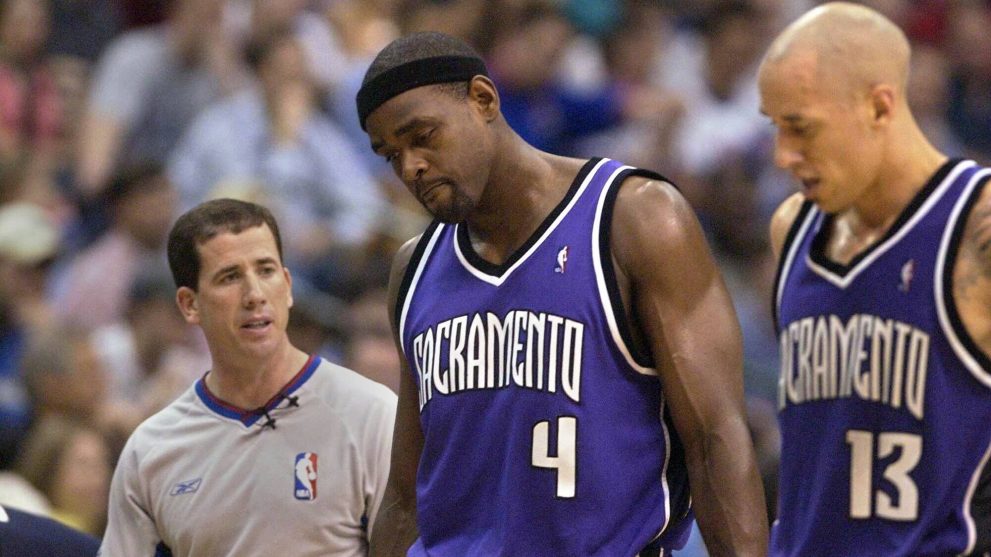One of the biggest betting scandals in American sports history took place from 2005-2007, when NBA referee Tim Donaghy gambled on his own games and made calls that affected the point spread.
The discovery was made in a round-about way, as the FBI was actually investigating broader organized crime activity.
Nearly two decades later, Andreas Krannich, the managing director of Sportradar Integrity Services, is absolute in his belief Donaghy would have been found out in real-time if it happened in the present-day.
Netflix has released the trailer for "UNTOLD: Operation Flagrant Foul."
Premiering August 30th, the doc tells the full story behind former NBA ref Tim Donaghy getting caught for betting on his own games.
(🎥: @netflix) pic.twitter.com/BI9V4218GD
— Boardroom (@boardroom) August 9, 2022
How? By the artificial intelligence his company uses to track more than 850,000 matches in 70 sports around the globe.
“A.I. is bringing a completely new layer of pattern analysis,” Krannich said. “It’s a game-changer. It’s a revolution, to be honest.”
Sportradar released its second annual “Betting Corruption and Match-Fixing” report on March 22, which revealed 1,212 suspicious matches in 2022, spanning 12 sports and 92 countries.
It was an increase of 34% from 2021, although the number of suspicion-free games still sat at 99.5%.
“We saw this massive increase of manipulated matches – almost 300 more than last year– but in total it was only a small percentage increase,” Krannich said. “It depends on which perspective you take, like, ‘Oh, more than 99.5% of all matches we monitor are legitimate. There’s nothing suspicious.’ Or you would say, ‘Oh, f—, over 1,200 manipulated matches.’”
Sportradar Integrity Services finds number of suspicious matches in 2022 increased 34%, as further application of AI enhances bet monitoring capabilities.
Read our Annual 2022 Integrity Report ➡️ https://t.co/4SflpVlGUI pic.twitter.com/kRSDW93K3p
— Sportradar (@Sportradar) March 23, 2023
While match-fixing at the highest level will get huge headlines, most of the work is done in lower leagues. More than half of the suspicious soccer matches in 2022 came from the third-tier or lower, per Sportradar, including regional leagues and youth competitions.
“Consider you are a burglar with very nice houses, rich people, and you see that 20% of the houses have the absolute newest surveillance system,” Krannich said. “Who will you choose? You can translate that into sports. … For NBA, NHL, Premier League, Bundesliga, they are over-staffed. They have a very good regulatory team, a very good legal team.
“But if you look into smaller international federations, the lower leagues, they neither have the capacity nor the expertise. It’s always a combination of return on investment and risk level. Of course you can make millions and millions on one case (at the highest level) but you can always make a decent amount on this lower league stuff, and get away with it.”
As the years go on, Krannich says the A.I. will become better and better at finding betting irregularities and flagging those matches, which are then taken on by a group of 65 human experts.
Krannich said the A.I. at Sportradar is advanced enough that the company has goals of predicting potential hot-spots for match-fixing before they happen.
“The first time I saw (the A.I.’s capability) I said, ‘This is impossible,’ it was so sophisticated,” Krannich said. “The system can really become a game-changer, in particular if we talk about organized crime groups, who are very smart, very sophisticated in how they switch on and off teams or athletes, and in the different jurisdictions. We see that entire teams, on one match day they are on, and then the next year-and-a-half, nothing. Same players, same team, same coach.”
Artificial Intelligence is changing the face of the betting industry.
In our new whitepaper, we explore what this technology is capable of, how it’s redefining how we manage sportsbooks, and what the future could look like.
Download it here ➡️ https://t.co/JukWWcLBLc pic.twitter.com/G24tlW9AVV
— Sportradar (@Sportradar) March 23, 2023
Sportradar recently identified a match-fix in an Australian basketball league. One team took a 20-point lead into halftime, where massive money came in on the trailing team to win the third quarter.
“It’s not NBA, but they have good basketball, and we had this situation,” Krannich said. “Three players were coming from a different country, playing on a specific team. They were the top players, the top scorers. The man of the match was deliberately not scoring in the third quarter, and then in the fourth quarter they again smashed the opponent.
“These are things our A.I. picked up.”
Krannich said Sportradar has not had a single false positive case in his 18-year history with the company. He said artificial intelligence will continuously improve, and it will be a huge help for sporting associations to safeguard their leagues from corruption.
“We were always investing into machine learning, but since 2018 we have implemented, slowly, slowly, our first artificial intelligence models,” Krannich said. “And now in ‘22 we really saw a massive impact. We were identifying concrete patterns that we had not seen before. This is something that we can be 100% sure will increase over the next months and years.”






